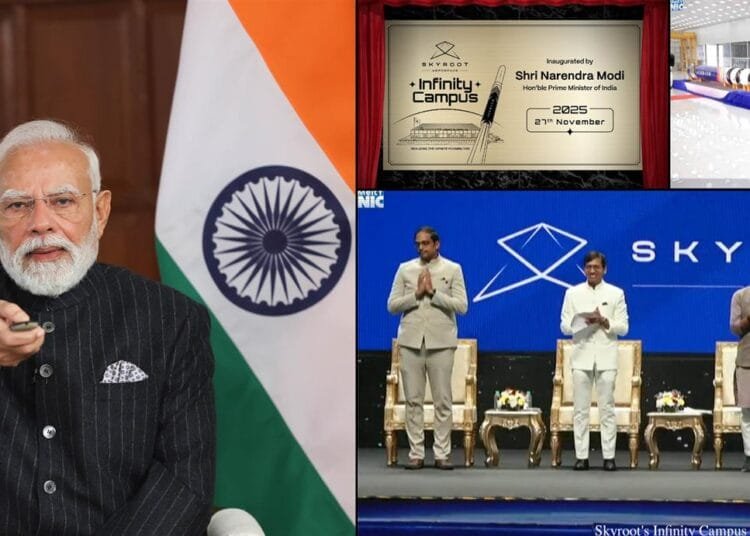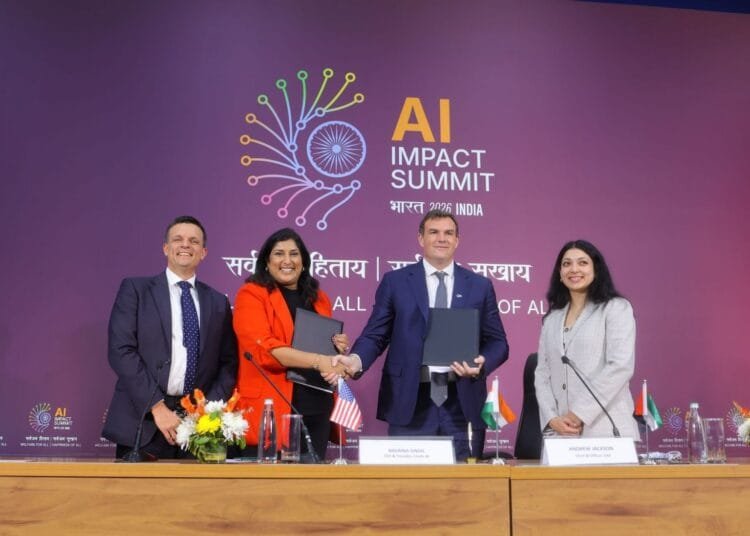ISRO has given new wings to India’s space
India is witnessing an unprecedented opportunity in the space sector and highlighted that India’s space ecosystem is experiencing a major leap with the private sector taking flight, said the Prime Minister, Narendra Modi, as he inaugurated the Skyroot’s Infinity Campus in Hyderabad via video conferencing on 27 Nov.
He emphasized that Skyroot’s Infinity Campus reflects India’s new thinking, innovation, and youth power, and underlined that the innovation, risk-taking ability, and entrepreneurship of the country’s youth are reaching new heights.
PM Modi stated that today’s program is a reflection of how India will emerge as a leader in the global satellite launch ecosystem in the coming times.
He extended his best wishes to Pawan Kumar Chandana and Naga Bharath Daka, noting that the two young entrepreneurs are an inspiration for countless young space entrepreneurs across the country. He stressed that both of them trusted themselves, did not shy away from taking risks, and as a result the entire nation is witnessing their success today, with the country feeling proud of them.
Pointing out that India’s space journey began with limited resources but emphasized that the nation’s ambitions were never limited, Modi remarked that from carrying rocket parts on a bicycle to developing the world’s most reliable launch vehicles, India has proven that the height of dreams is determined not by resources but by resolve.
“ISRO has for decades given new wings to India’s space journey and stressed that credibility, capacity, and value have established India’s distinct identity in the sector,” exclaimed the Prime Minister.
Noting that in the changing times, PM Modi remarked that the expansion of the space sector is evident, as it has become the foundation for communication, agriculture, marine monitoring, urban planning, weather prediction and national security.
He stated that this is why historic reforms were undertaken in India’s space sector, with the government opening it to private innovation and preparing a new Space Policy. Shri Modi further remarked that efforts were made to connect startups and industry with innovation, and IN-SPACe was established to provide ISRO’s facilities and technology to startups.
He highlighted that today more than 300 space startups are giving new hopes to India’s space future, and noted that most of these startups began with small teams—sometimes two people, sometimes five, sometimes in a small rented room—with limited resources but with determination to reach new heights.
“This spirit has given birth to the Private Space Revolution in India,” underlined the Prime Minister, stating that Gen-Z engineers, designers, coders, and scientists are creating new technologies, whether in propulsion systems, composite materials, rocket stages, or satellite platforms, and stressed that India’s youth are working in areas that were unimaginable just a few years ago.
He remarked that India’s private space talent is establishing a distinct identity across the world and added that today, for global investors, India’s space sector is becoming an attractive destination.
Background
Indian space startup Skyroot’s Infinity Campus, is a state-of-the-art facility with around 200,000 square feet workspace for designing, developing, integrating and testing multiple launch vehicles, with a capacity to build one orbital rocket every month.
Skyroot is India’s leading private space company, founded by Pawan Chandana and Bharath Dhaka, both alumni of Indian Institutes of Technology and former scientists of ISRO turned entrepreneurs. In November 2022, Skyroot launched its sub-orbital rocket, Vikram-S, becoming the first Indian private company to launch a rocket to space.
The rapid rise of private space enterprises is a testament to the success of the transformative reforms carried out by the Government in the last few years, reinforcing India’s leadership as a confident and capable global space power. Fiinews.com










